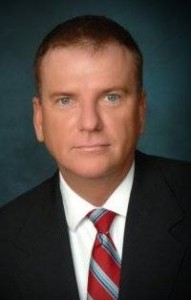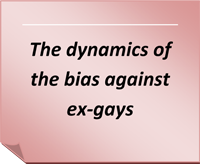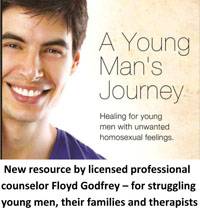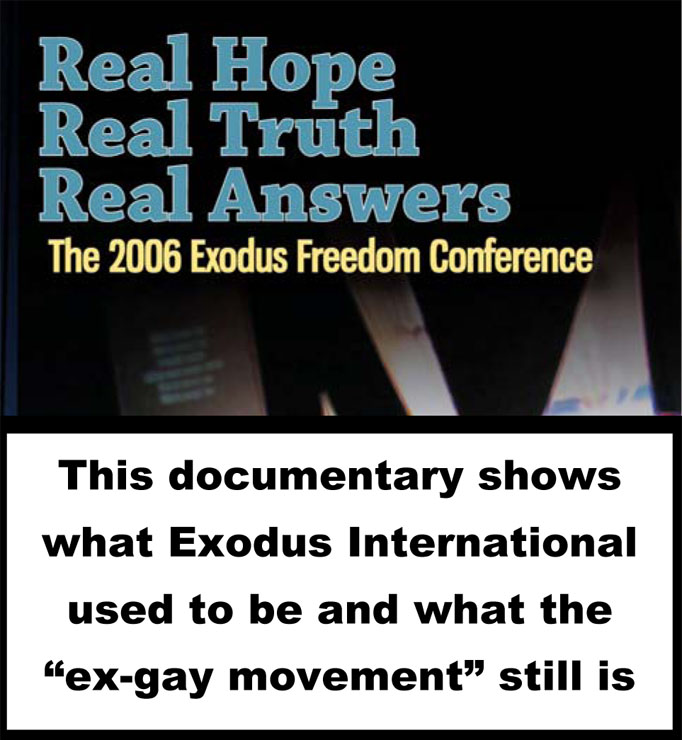Greg Quinlan
 Source:
Source:
Compiled by Thomas Coy from a bio of Greg Quinlan from Parents and Friends of Ex-Gays and Gays (PFOX) procured in March of 2010, an article by Michael J. McManus in Religion and Ethics from May 24, 2006 entitled “Causes & Cures of Homosexuality,” and excerpts from an August 1998 Focus on the Family “Citizen” magazine article entitled “Former Homosexual now a Pro-family Lobbyist” written by Clem Boyd.
Born:
1958
Family Status:
Married
General Information as of 2010:
Greg Quinlan is a registered nurse. As a gay identified man Greg helped care for AIDS patients when the AIDS epidemic hit the gay community hard in the mid-1980s. At the age of 30 he joined the Human Rights Campaign, the largest gay and lesbian political organization in the United States, forming a branch in his home town of Dayton, Ohio. Since leaving the homosexual life Greg has shared his testimony on radio programs and Christian television. He has been quoted in USA Today, The Wall Street Journal, The New York Times, and World Net Daily.
Greg has been working with the New Jersey Family Policy Council to protect the sanctity of marriage and is a board member of Parents and Friends of Ex-Gays and Gays (PFOX). He is an advocate for the ex-gay movement; emphatically arguing that citizens get accurate information about the changeability of sexual orientation so that those with unwanted same-sex attractions know they have an option other than the gay lifestyle. In 2009 at a shareholders meeting of PepsiCo Greg informed the Board that the gay political organizations they were funding promoted “fear and hostility against the ex-gay community.” In March of 2010 on behalf of PFOX Greg addressed the corporate directors of the Walt Disney Company at its annual shareholder’s meeting and asked them to approve a resolution to include ex-gays in Disney’s mandatory diversity training for employees.
Personal Testimony:
Greg Quinlan was one of four children growing up with an abusive father. Although his mother was a born-again Christian, his father was “an atheist with an attitude;” an Archie Bunker type with the added element of violence. Greg was usually the one his father would choose to abuse. Twice his father’s beatings put him in the hospital. “One day at age 8, in front of his friends, Greg asked his dad, “You hate me, don’t you?” His dad cursed and replied, “Yes, I hate you.” Greg sighed, “I knew that.””
Greg’s mother regularly took her children to church and at the age of nine he “professed his faith in Jesus Christ,” but life at home with his father only got worse. At the age of ten a thirteen year old boy from across the street introduced him to sex. Greg recalled that time in his life, “I knew it was wrong, but what I got was affirmation, affection, approval and someone touching me who was not beating me up.”
“At age 23 Greg made his sexual behavior public, “blowing the doors off the closet,” as he describes it. He had many sexual encounters, visited gay bathhouses all across the state, was a regular patron of porn shops and lived the party life within gay social circles.” He considers himself very fortunate that he is HIV-negative after living the promiscuous gay lifestyle. He believes it was God’s providence that he is not infected with the HIV virus.
“As a registered nurse, Greg began taking care of AIDS patients when the crisis hit the Dayton-area in the mid 80s. He took these men to the doctor and cared for them at home. “Then this guy I was dating invited me to a dinner in Columbus in 1986, the Human Rights Campaign Fund (HRCF) reception,” he recalled. “That’s how I was introduced to gay politics, at age 28.””
“Two years later he started an HRCF branch in Dayton. “HRCF is the largest gay and lesbian political organization in the country, chiefly responsible for securing AIDS research money from the federal government,” Greg said. “I raised several thousand dollars out of Dayton and really got involved because of the AIDS project. But in all my work with HRCF I was trying to justify being in the lifestyle, because I was miserable.””
“Quinlan started watching the 700 Club. At first, he wanted to “reach through the set and strangle Pat Robertson. But he saw an ex-gay on the show who shared how he left the lifestyle. “EX GAY?” he asked himself. “How is that possible? But I hated my life. There is pleasure in sin for a season, but I wanted out.”” Greg “watched intently – partly making fun, partly wishing it was true.” Greg “thought, ‘Can it happen to me?’”
Greg “called a Christian friend across the country and asked him to lead him in making a re- commitment to Christ.” When Greg prayed to God admitting his sin and recommitting his life to Jesus Christ, he “had peace.” It was Thanksgiving weekend, 1993 and he decided to call TBN.
“”You know I had been on TV, radio and in newspapers (as a homosexual activist),” Greg said, “I was not ashamed of being a homosexual and talking about the AIDS crisis. I’d go to Washington D.C. two to three times a year to lobby Capitol Hill. But I had a lot of trouble telling this guy what my problem was. I was suddenly ashamed of being gay. I wasn’t happy about it.””
“Greg’s decision resulted in a sudden and abrupt turn in his life. He got into church immediately, changed his telephone number, stopped hanging out at gay bars, and discontinued his volunteer nursing with the Dayton Area AIDS Task Force. “I stopped cold turkey doing anything in the gay lifestyle,” he said.”
During this same time period “Greg’s father, who was dying due to smoking, asked his son, the RN, to care for him. One day Greg told his dad, “I can’t be here tomorrow, due to work.” His father, who had undergone a deathbed conversion, replied, “That’s OK. I love you, Greg.” He was stunned. Prompted by a nurse, he replied, “I love you too, Dad.”” Greg’s father died the next day.
Greg had a lot of reasons to be angry, but when he “started on a path of truly forgiving his father, his anger and bitterness left – along with his homosexual desires.”
“As a grass roots lobbyist I went to Capitol Hill for the lunatic left,” Greg said. “HRCF trained me how to do it and a year later I was using my training for the other side. The Lord turned it all around.”
Greg is one of the most visible and outspoken ex-gays in America. He started an Ohio ministry, the Pro Family Network, which lobbied for passage of Ohio’s one man, one woman Marriage Amendment and he is a board member and spokesperson for PFOX (Parents and Friends of Ex-Gays and Gays). He talks to teens about the complex issue of homosexuality, giving them insights that academia and the media suppress. He has debated a person’s right to self-determine their sexual orientation and has defended traditional marriage in 17 states and the District of Columbia. Greg Quinlan now works vigorously with the New Jersey Family Policy Council to protect the sanctity of marriage.
For choosing to defend the interests of individuals with unwanted same-sex attractions, the public’s right to know that homosexuality is changeable, the teenager’s right to know that the gay lifestyle is often miserable, and one man one woman marriage, Greg has been screamed at and heckled by gay activists. Greg has also received death threats, which has been hard for his wife on many levels.
Factors of Homosexual Causation:
As with the vast majority of male homosexuals Greg Quinlan’s childhood was full of hurt and rejection. Greg did not identify with his father as a young child; if he had he probably would have become an abusive and violent adult. Every young boy needs same-sex affirmation that he is a male and an adolescent boy needs affirmation that he is becoming a man. Greg did not get the male affirmation that he needed so when an older neighborhood boy introduced him to sex, it filled that void in an unhealthy way.
Most would agree that if a 13 year old boy introduces a 10 year old girl to sex it is molestation. The same standard should apply to a 13 year old boy introducing a 10 year old boy to sex. Greg has stated, “Growing up as a teen, I was interested in sex with other men only because of that introduction. I’ve known thousands of homosexuals and I’ve never met someone who was not introduced to sex at an early age, generally with the same sex.”
Motivations to Change:
Greg Quinlan had an active homosexual sex life, but he was miserable as a gay man. He could not deny that he hated his gay life and when he saw a former homosexual give his testimony on TV it gave him the hope that he could get out of homosexuality.
There was also a religious motive to change. Buried in the subconscious or in religious terms in the depths of his soul, he believed his homosexual behavior was immoral. When Greg called a friend to lead him in a prayer of reconciliation with God, he immediately felt peace.
From a Christian perspective Greg made a heartfelt profession of faith at age nine. The Scriptures show that while God judges man He is also merciful, compassionate and patient, “not wanting anyone to perish, but everyone to come to repentance.” (2 Peter 3:9) God did not give up on Greg, and when Greg turned to God, like the Parable of the Lost Son in Luke chapter 15, God ran to meet him.
Process of Change:
From Greg’s testimony there is not a lot of information on his process of change. The peace he felt from reconciling to God was real and he built upon it. Intuitively he knew that his gay friends would mock his new direction in life and hinder his growth as a Christian, because he was convinced that homosexual behavior was immoral. His gay friends would not be sympathetic to him rejecting his gay identity as their own lives were built upon a gay identity. Greg wisely “stopped cold turkey doing anything in the gay lifestyle.” He obviously filled that void with people who were supportive and empathetic with the new direction in his life.
Obviously, Greg’s father’s deathbed conversion and his father telling Greg that he loved him helped Greg begin the process of forgiveness and reconciliation of past wounds. The time he spent caring for his dying father probably added to his ability to reconcile. It was through the process of forgiving his father that his bitterness and anger healed. As this healing increased his residual homosexual desires left.




